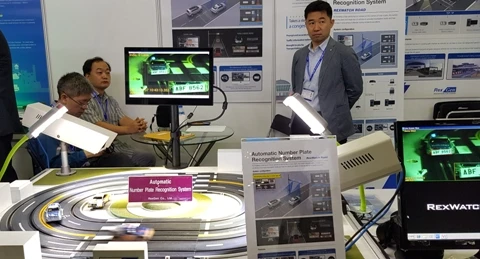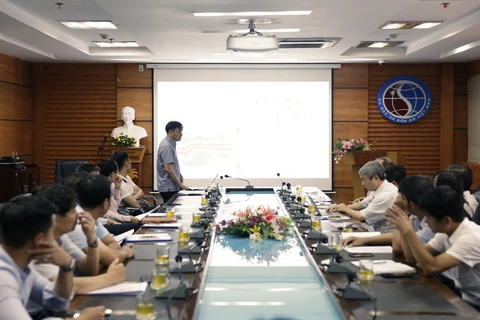 Deputy Prime Minister Trinh Dinh Dung and delegates press the launch button during a ceremony to debut VNGEONET. (Photo: VNA)
Deputy Prime Minister Trinh Dinh Dung and delegates press the launch button during a ceremony to debut VNGEONET. (Photo: VNA) Hanoi (VNA) – The Ministry of Natural Resources and Environment on December 27 launched a nationwide network of stations that constantly log and process satellite-based GPS data for better mapping and surveys.
The network is expected to vastly modernise the country’s mapping and surveying technologies and deliver accurate and timely information.
After four years of construction, installation, and staff training, with technical assistance and technology transfer from Swiss experts, the national network VNGEONET has been completed with 65 Global Navigation Satellite System (GNSS) stations covering the entire country and one data processing centre in Hanoi, the environment ministry said.
Geolocation data the stations receive from satellites around the clock will be transferred to the centre in Hanoi to be processed, which will then be fed to VNGEONET users in real time via 3G or 4G networks.
The delta regions in the north and the south as well as the mid-section of the central region – the country’s three most important economic centres – will be covered by 41 stations, with the average distance between stations decreased to 50-80km to ensure higher accuracy.
Hoang Ngoc Lam, Deputy Director-General of the Department of Survey and Mapping, said this network was part of five-year project that aims to provide necessary data to build a “complete, consistent, and uniform” national mapping database that covers all mainland, seas and island territories of the country from 2020 to 2024.
He said that Global Positioning System (GPS) was used for civilian purposes in the US since the 80s and Vietnam started applying the technology in making maps and conducting measurements since the 90s.
With advancements in information technology, GPS had seen increasing use in all economic sectors, Lam said, adding that most developed nations had already built their own.
It is considered essential in promoting economic growth, promoting Earth sciences and bettering anti-natural disaster and relief efforts, as well as aiding in the upholding of national security and defence.
The department said it would build and update the national maps in 1/2,000 and 1/5,000 scales for various purposes.
So far, the 600 registered accounts on VNGEONET (https://www.vngeonet.vn) have mainly used the service for land management and map drawing, with Hanoi, Thai Nguyen, Quang Ninh and HCM City leading the number of accounts.
The VNGEONET network is also useful in calculating and determining the speed of plate tectonic surface displacement as well as the speed of land elevation or subsidence with accuracy of changes down to the millimetres, which will help bring about timely warnings and solutions.
According to the plan, there will be about 160 stations covering Vietnam’s territory./.
VNA






















